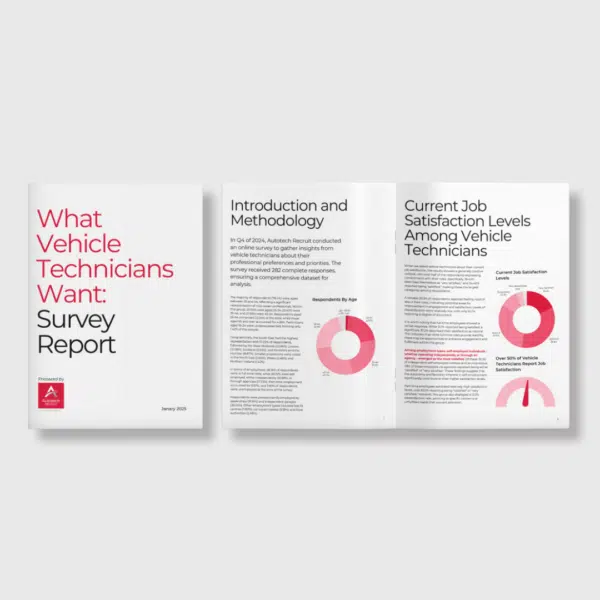A new survey by Autotech Recruit has revealed that working hours are the most critical factor for UK vehicle technicians across all age groups. Autotech Recruit polled vehicle technicians aged 18 to 54 across the UK to uncover their professional priorities.

Dealerships (32%) and independent garages (26%) were the primary employers, with 58% in full-time roles and 29% self-employed, while the remainder were either in part-time employment or currently unemployed.
Nearly 79% of respondents rated working hours as ‘Very Important’, surpassing even salary, highlighting the growing emphasis on work-life balance within the automotive workforce. Flexibility, no weekend work, and holiday allowances also ranked in the top five of important factors when searching for a job, underlining the shifting expectations of vehicle technicians across all age groups.
These findings come at a pivotal moment, as the Motor Ombudsman recently reported that almost a third (29%) of independent garages are considering adjusting their opening hours to support staff well-being. This shift validates the urgent need for industry-wide changes to improve work-life balance to attract and retain talent.
The report also unveiled a concerning trend – 70% of vehicle technicians admitted they are considering leaving their current employment. Reasons ranged from seeking external opportunities to starting their own independent businesses or leaving the industry altogether.
“The survey findings emphasises a critical challenge for the automotive industry,” comments James Mackay, Sales Director for Autotech Recruit and Autotech Academy. “With 70% of vehicle technicians considering leaving their current roles, it’s clear that the sector needs to adapt to the evolving priorities of its workforce. Work-life balance, flexibility, and career progression are no longer optional – they are essential.”
Age significantly influences priorities
The survey set out to understand the motivational drivers of vehicle technicians as a key to fostering retention across varying career stages. The findings revealed that age significantly influences priorities, with the youngest employees focusing on progression and skill-building (75%) for those under 25, while older groups (25 and above) prioritise financial rewards. These shifting motivations can inform targeted strategies for workforce management and professional development.
The survey revealed that among younger employees aged 18-24, the emphasis is primarily on stability, with half of the respondents expressing a desire to stay in their current roles. However, a notable 25% are already eyeing external promotions, highlighting early ambitions to progress their careers.
For those aged 25-34, career aspirations become more diverse. While the majority (23.73%) still prioritise remaining in their current roles, entrepreneurial ambitions surface, with 20.34% keen on starting their own businesses. Transitioning to a different industry also gains traction in this group, appealing to 15.25% of respondents as they explore broader opportunities.
“Younger technicians are a driving force for industry innovation,” James continues. “However, their frustration with the lack of opportunities is a wake-up call for employers. Without clear paths for growth, we risk losing their potential to other sectors.”
As professionals move into the 35-44 age range, stability remains a key focus (25.76%), but internal promotions (23.40%) start to play a bigger role, reflecting a desire for a more established position within their fields. Interestingly, this group also exhibits a balanced interest in alternative career paths, such as starting a business, contracting, or industry switching, each garnering 12.12%.
Mid-career technicians demand stability and fair pay
Mid-career individuals aged 45-54 increasingly look to contracting as an attractive option (21.79%), potentially valuing the flexibility and autonomy it offers. Stability (15.38%) and external promotions (11.54%) remain relevant, but the desire to transition industries (12.82%) suggests an openness to change even at this stage.
Among respondents aged 55-64, stability strengthens as a dominant priority (36.51%), although a significant portion (20.63%) are considering contracting, indicating an appetite for flexible work arrangements.
For those aged 65 and above, stability and contracting share equal appeal (33.33% each), highlighting a dual focus on maintaining a steady career while exploring adaptable working conditions in later life.
An industry at a tipping point
The survey’s findings come at a critical time for the automotive sector. With the average age of technicians 40 or older, the industry faces the prospect of a widening skills gap as retirements accelerate. At the same time, younger workers are voicing a strong desire to progress, and mid-career professionals are demanding better incentives and work-life balance.
The data also highlights changing attitudes toward employment types. While full-time roles remain dominant, 58% of technicians are in permanent positions and younger workers are showing a growing interest in alternative arrangements like self-employment where they will have greater power over their work-life balance.
Across all age groups, over half (51.06%) value having access to modern tools and technology in their workplace.
Employers must act now
“We are hopeful that these insights will help automotive employers create targeted people management strategies to meet the evolving needs of their workforce and retain talent,” concludes James. “The generational divide is clear, and a one-size-fits-all approach to workforce management isn’t sustainable. Employers are under increasing pressure, but it is vital that they listen to their technicians and offer tailored solutions, from better career progression opportunities for younger workers to fairer incentive schemes for mid-career professionals.”
Download the complete survey report here and explore the key findings in detail.

